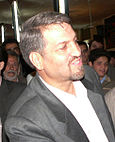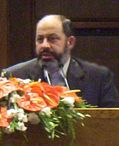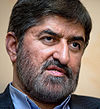| |||
All 290 seats to the Islamic Consultative Assembly 146 seats are needed for a majority | |||
|---|---|---|---|
| Turnout | 66.2%[1] | ||
| |||
 |
|---|
| Government of Islamic Republic of Iran |
The parliamentary election for the 9th Islamic Consultative Assembly, or Majlis, were held in Iran on Friday, 2 March 2012 with a second round on 4 May 2012 in those 65 districts where no candidate received 25% or more of the votes cast. More than 5,000 candidates registered but more than a third were disqualified[9] by the Guardian Council leaving about 3,400 candidates to run for the 290 seat representing the 31 provinces.
The election has been described by journalists and analysts "as a contest between" Iran's Supreme Leader Ali Khamenei and president Mahmoud Ahmadinejad,[9] with Khamenei supporters winning a large majority of seats.[10] Iranian officials and state media have described the election as a sign of Iranians' trust in the Islamic Republic and a message to the West rejecting pressure over Iran's nuclear program.[10][11] Although no final election turnout figures were released,[11] state media emphasized that voter turnout was high.[11]
The parliament has "no direct control over key foreign and security policy matters" but some influence over those policies and coming elections.[11] In the wake of the crushing of reformist protest against the 2009 election results, few if any reformist candidates were allowed by the Guardian Council to run.[12] The new parliament was opened on 27 May 2012.
- ^ Ehteshami, Anoushiravan (2017). "Politics of the Islamic Republic". Iran: Stuck in Transition. The Contemporary Middle East. Taylor & Francis. p. 63. ISBN 9781351985451.
- ^ "Political road map of Iran before the Parliamentary (Majlis) elections". Today's Zaman. Archived from the original on March 30, 2015. Retrieved March 10, 2015.
- ^ a b c d e "تعداد و درصد گرايش سياسي نمايندگان مجلس نهم". Mizan Online. Retrieved March 10, 2015.
- ^ Bozorgmehr, Najmeh (February 23, 2012). "Hardline group emerges as Iran poll threat". Financial Times. Retrieved March 10, 2015.
- ^ "تشديد اختلافات در آستانه انتخابات؛ اصولگرايان هشت فهرست انتخاباتي مي دهند" (in Persian). Radio Farda. Retrieved March 10, 2015.
- ^ "خواهر احمدي نژاد شکست خورد/ کواکبيان هم به مجلس نرفت" (in Persian). Khabar Online. Retrieved March 10, 2015.
- ^ a b "ناکامان بزرگ انتخابات مجلس نهم" (in Persian). Deutsche Welle. 5 January 2008. Retrieved 10 August 2015.[permanent dead link]
- ^ Cite error: The named reference
Oye!was invoked but never defined (see the help page). - ^ a b Iran elections clouded by doubts 02 Mar 2012
- ^ a b Elections in Iran Favor Ayatollah’s Allies, Dealing Blow to President and His Office By NEIL MacFARQUHAR| 4 March 2012
- ^ a b c d Iran Elections 2012: Ahmadinejad Routed By Rivals By ALI AKBAR DAREINI 05/05/12]
- ^ Cite error: The named reference
APwas invoked but never defined (see the help page).
Cite error: There are <ref group=lower-alpha> tags or {{efn}} templates on this page, but the references will not show without a {{reflist|group=lower-alpha}} template or {{notelist}} template (see the help page).








